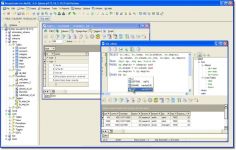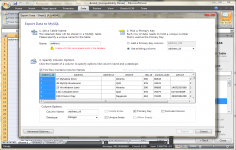 MySQL 5.1.66
MySQL 5.1.66
MySQL AB - (Open Source)
MySQL is a successful open source database used in most web applications, e-commerce and online transaction processing.
MySQL is one of the world's most famous and used open source database. The software can be used to manage web applications, e-commerce and online transaction processing since MySQL database incorporates support those transactions. It is also commonly associated with PHP when it comes to managing websites.
With standard JDBC , ODBC, and Net, the developer can choose the programming language. MySQL has the advantage of working with almost all the popular operating systems and communicate easily with programming languages ​​such as C, C + +, VB, C #, PHP, Python, Ruby, Java, Perl, Eiffel, etc.MySQL replication allows you to create profitable applications. In addition, it enables the development of typologies replication complex and massive chain.Its reliability and robustness, performance, ease of use makes MySQL have more success than anticipated.
- Title:
- MySQL 5.1.66
- File Size:
- 38.7 MB
- Requirements:
- Windows 9x / 2000 / XP / Vista / Windows7 / Windows8
- Language:
- en-us
- License:
- Open Source
- Date Added:
- 30 Sep 2012
- Publisher:
- MySQL AB
- Homepage:
- http://www.mysql.com
- MD5 Checksum:
- 0B98B74D7E9B6D9E0F8921CC52715D5A
# Bugs Fixed
* InnoDB: Certain information_schema tables originally introduced in MySQL 5.6 are now also available in MySQL 5.5 and MySQL 5.1: INNODB_BUFFER_PAGE, INNODB_BUFFER_PAGE_LRU, and INNODB_BUFFER_POOL_STATS.
* InnoDB: When a SELECT ... FOR UPDATE, UPDATE, or other SQL statement scanned rows in an InnoDB table using a < or <= operator in a WHERE clause, the next row after the affected range could also be locked. This issue could cause a lock wait timeout for a row that was not expected to be locked. The issue occurred under various isolation levels, such as READ COMMITTED and REPEATABLE READ.
* Partitioning: The buffer for the row currently read from each partition used for sorted reads was allocated on open and freed only when the partitioning handler was closed or destroyed. For SELECT statements on tables with many partitions and large rows, this could cause the server to use excessive amounts of memory. This issue has been addressed by allocating buffers for reads from partitioned tables only when they are needed and freeing them immediately once they are no longer needed. As part of this fix, memory is now allocated for reading from rows only in partitions that have not been pruned.
* Replication: In master-master replication with --log-slave-updates enabled, setting a user variable and then performing inserts using this variable caused the Exec_master_log_position column in the output of SHOW SLAVE STATUS not to be updated.
* Small sort_buffer_size values could result in a server crash.
* The libmysqlclient_r client library exported symbols from yaSSL that conflict with OpenSSL. If a program linked against that library and libcurl, it could crash with a segmentation fault.
* The argument for LIMIT must be an integer, but if the argument was given by a placeholder in a prepared statement, the server did not reject noninteger values such as '5'.
* Access to INFORMATION_SCHEMA tables through a view could leak memory.
* A query for a FEDERATED table could return incorrect results when the underlying table had a compound index on two columns and the query included an AND condition on the columns.
* The argument to the --ssl-key option was not verified to exist and be a valid key. The resulting connection used SSL, but the key was not used.
* In debug builds, an InnoDB assertion was overly aggressive about prohibiting an open range.
* Adding a LIMIT clause to a query containing GROUP BY and ORDER BY could cause the optimizer to choose an incorrect index for processing the query, and return more rows than required.
* mysqlbinlog did not accept input on the standard input when the standard input was a pipe.
Related software
4.7/5 from 47 users


